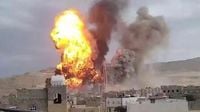In a significant escalation of tensions in the Middle East, Israel's Defense Minister Israel Katz issued a stark warning on Thursday, May 8, 2025, stating that Yemen's Houthi rebels would face severe repercussions if they continued to target Israeli interests. This warning comes on the heels of a recent ceasefire agreement between the Houthis and the United States, which, notably, does not protect Israel from Houthi aggression.
The backdrop to this announcement was a missile fired by the Houthis that struck Ben Gurion International Airport in Israel, prompting a swift Israeli military response. Katz declared, "Israel must be able to defend itself on its own against any threat and any enemy," emphasizing that the Israeli army is prepared for any mission. He further accused the Iranian leadership of financing the Houthi organization, asserting that the time for restraint was over and that the "axis of evil has collapsed." Katz suggested that Israel's military actions could mirror those previously executed against Hezbollah, Hamas, and Assad, indicating a readiness to escalate military operations against Iran if necessary.
On Tuesday, May 6, 2025, U.S. President Donald Trump announced the cessation of American airstrikes against the Houthis, claiming that the group had agreed to halt attacks on U.S. vessels. However, the Houthis swiftly clarified that their ceasefire agreement did not extend to Israel, with senior official Abdulmalik Alejri stating, "The waterways are safe for all international ships except Israeli ones." This declaration highlighted the ongoing animosity and the Houthis' intent to maintain their campaign against Israeli interests, particularly in the Red Sea.
In a further demonstration of this hostility, on May 7, Houthi spokesman Yahya Saree confirmed that their forces had launched drone attacks targeting Ramon Airport in southern Israel and a "vital target of the Zionist enemy" near Tel Aviv. These actions were framed as part of their broader campaign in solidarity with the Palestinians, which has included attacks on Israeli-linked shipping since November 2023.
The recent U.S.-Houthi ceasefire followed weeks of intense military engagement, with U.S. strikes reportedly killing around 300 people and targeting over 1,000 sites in Yemen. The Pentagon described these operations as part of a mission dubbed "Rough Rider," aimed at deterring Houthi attacks on international shipping routes. The ceasefire agreement was facilitated by Oman and marked a significant turning point in the conflict, although it left Israel vulnerable to ongoing Houthi aggression.
In addition to military engagements, the conflict has had dire humanitarian implications. Hundreds of Yemeni travelers found themselves stranded abroad following the cancellation of Yemenia Airways flights to the Houthi-controlled Sana'a airport, which was severely damaged in Israeli airstrikes. On May 7, Yemenia officials reported that many Yemenis were trapped at Queen Alia International Airport in Jordan, with three flights canceled, each expected to carry 150 passengers. The airline is considering ferrying stranded passengers to Aden, the base of the internationally recognized Yemeni government, and then busing them to their homes.
As the situation escalates, the humanitarian crisis continues to deepen. The destruction of Sana'a airport has left many patients, traders, and students stranded, with reports indicating that 90% of the stranded passengers are patients requiring urgent medical attention. The Houthis have claimed that Israeli airstrikes destroyed six planes, including three Yemenia aircraft, further complicating efforts to transport individuals in need.
In the wake of the missile strike on Ben Gurion Airport, Israel launched Operation Port City, which involved extensive airstrikes on Houthi targets in Yemen. Israeli Air Force jets struck the port of Hodeidah and later targeted Yemen's central airport in Sana'a, causing significant damage. This operation was characterized by its rapid execution, with Israeli officials stating that it was a direct response to Houthi aggression. Maj. N., a deputy commander involved in the operation, noted the complexity of executing such missions at a distance of approximately 1,200 miles from Israel, emphasizing the need for meticulous planning and coordination among various Air Force units.
As the region braces for potential further escalations, the international community is calling for restraint. The United Nations has urged all parties to de-escalate tensions and prioritize diplomatic solutions to the ongoing conflict. However, with both the Houthis and Israel demonstrating a willingness to engage in military action, the prospects for peace remain uncertain.
Yemen's ongoing civil war, compounded by external interventions, has created a complex and volatile situation that continues to evolve. As both sides prepare for possible further confrontations, the humanitarian fallout from these military engagements is likely to exacerbate the already dire conditions faced by civilians caught in the crossfire. The recent developments underscore the urgent need for a comprehensive approach to address the multifaceted challenges in the region, balancing military readiness with humanitarian considerations.





